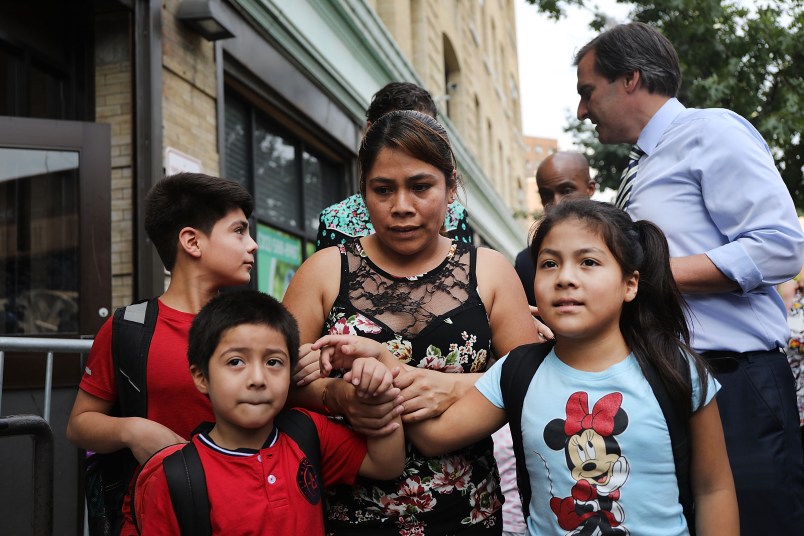For weeks, U.S. District Judge Dana Sabraw has praised the Trump administration’s uneven progress on reuniting the thousands of immigrant families it had forcibly separated – and has held off on holding the administration in contempt even when it blew the reunification deadline for dozens of children younger than 5 years old.
But at a status hearing in San Diego on Monday in the American Civil Liberties Union’s class action lawsuit on the reunifications, Sabraw had had enough.
Sabraw granted the ACLU a temporary stay blocking the government from swiftly deporting the reunited families while he mulls an injunction. When Justice Department attorney Sarah Fabian complained the move might delay the upcoming reunifications, because ICE has a limited amount of space to hold families and they were counting on that space to be freed up with deportations, he cut her off.
“That’s not an option. That just shouldn’t be happening,” he said tersely. “If space is an issue, the government can make space.”
Sabraw also issued a long, stern scolding from the bench reminding the Trump administration that it “improperly separated parent and child” in the first place and now has the ability and responsibility to bring them back together both quickly and safely, two mandates that he said are not mutually exclusive.
Calling the government’s argument that the fast-tracked reunifications would put children in danger “deeply troubling in many respects,” Sabraw repeated what he has said in several hearings and court orders — that the government has to stop subjecting parents separated from their children at the U.S.-Mexico border to the same strict vetting procedures as other relatives or sponsors who step forward to claim immigrant children who arrive in the U.S. alone, such as a mandatory DNA test, a criminal background check, and the fingerprinting of everyone who will live in their household.
Sabraw said the administration was behaving as if they were in a “bubble” by insisting on those vetting steps, accusing them of having “a fundamental misapprehension of context of this case.”
“It’s completely unhelpful and doesn’t get to the issues in this case where families are being separated without any finding or determination of parentage, fitness or danger to the child,” he said. “Most individual parents in the class are parents without criminal history or any indication of lack of fitness or danger, so the process that ought to be in place is one of de-selection. It should assume the government has improperly separated parent and child and just be looking for red flags, because child welfare is still a paramount consideration.”
For the thousands of families yet to be reunited, Sabraw has ordered the Trump administration to only subject parents and children to a DNA test where there is a suspicion grounded in evidence that they are not actually related.
To stick with the vetting steps for unaccompanied minors, Sabraw emphasized, “does not comport with fundamental due process rights. It’s inviting a process of delay at the expense of children and parents.”
When DOJ attorney Scott Stewart attempted to mollify Sabraw by inviting him to visit one of the shelters holding the children in person to see that they are “being well cared for,” Sabraw curtly responded that he was missing the most important factor in the case.
“The concern at issue is simply the passage of time,” he said. “No matter how nice the environment is, the separation from a parent, particularly for a young child, is what matters. That’s the principle issue we’re dealing with. The safe environment is assumed.”
In another act of damage control, the DOJ attorneys representing the Trump administration in the case flew Department of Health and Human Services official Jonathan White out to the San Diego courtroom to take the witness stand to testify about the reunification process he is overseeing. Both the ACLU and the DOJ questioned White, who revealed for the first time that the Trump administration has not been able to match 71 of the separated children in its custody with any parent.
In an abrupt shift in tone, Sabraw thanked White profusely for flying across the country to testify and praised his work at HHS to “make it right.”
“When I hear your testimony, I have every confidence you are the right person to do this,” he enthused. “I have the impression you are operating in absolute good faith.”







I hope these folks are about to discover one of the cardinal rules of court: never look a judge in the eye and say, “Make me.”
Time to place some administration people in custody until their parentage can be conclusively determined.
The comments from the judge are moving in the right direction.
But it’s time for someone (multiple people) to be held in contempt of the court.
Related: Has anyone else noticed that in all of the reunions to date the children appear zombie-like? It’s fairly obvious these kids are being drugged right up to the time they are released.
Throughout this nightmare, the maladministration and its stooges have repeatedly argued that the children were being given food, education, and various other things, as if that somehow made the whole situation okay.
But we do that much for convicted murderers in prison.
It’s as if a kidnapper argued that no crime was committed because he didn’t actually starve the victim to death.
It’s called Willful / Calculated Obtuseness.